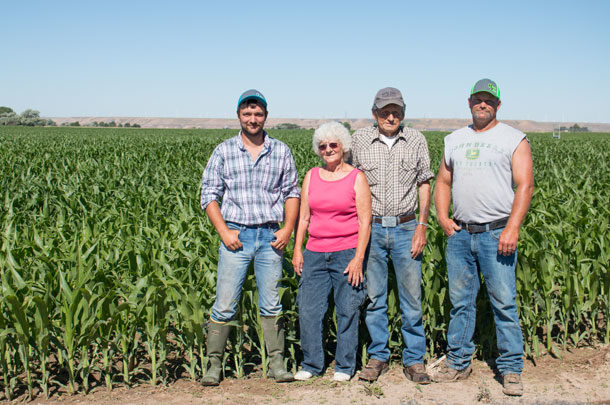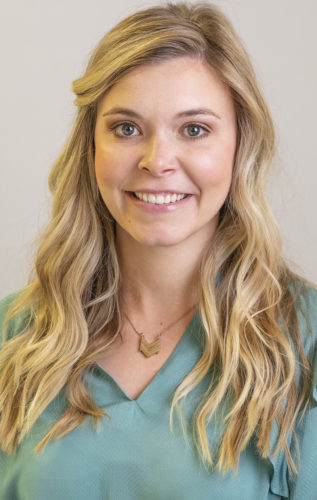Today I introduce you to Velma Riddle, a two-bucket farm gal from Tuttle, Idaho, and did I mention she is 73 years old? Her husband, Len, I believe describes her best: “She does everything, and what she doesn’t do, she could do.”
My husband first came across Velma while working on a neighboring farm this spring. It’s very rare that I get a phone call from him at work, but this time he called me in awe of a particularly “young” lady who was seated behind an 8230 John Deere tractor.
But that wasn’t all that captured my husband’s attention; every couple of swipes with the disc, she would get out of the tractor and pick up large rocks and place them on the steps leading up to the cab. Fooled by the white hair, he went over and asked her if she needed any help moving the rocks. Velma politely replied, “Oh, no. I can do it.”
Knowing he would be reprimanded for passing up a good story like this, he proceeded to play journalist and snapped the lovely photo of Velma at work (thank goodness for cellphones these days). To Velma, it was just another day on the farm, but to my husband and I, it was a good reminder of what farming is all about.

Farming through the years
It was 1961. Len and Velma had just graduated high school and merely a month later they decided to tie the knot. Both coming from farming backgrounds, it wasn’t a question as to “if” they would farm, but “when.”
At 18 years old, they didn’t want their parents or anyone else to sign off for them on a loan, so they waited until their 21st birthdays to chase after their dream. Starting with 40 acres of corn silage and hay, and a few milk cows, they slowly grew their dream into what is primarily today 2,000 acres (half owned, half leased) of alfalfa, silage corn and grain corn.
“When we got married, I had a ’57 Chevy pickup that was all fixed up, and I always thought they were a ‘purty’ pickup, so when I got out of school, we bought one, and when we turned 21, we sold that ’57 pickup, and that was in the down payment on the farm,” Len says. “And, I probably shouldn’t be telling you this, but when we got married, Velma had 200 dollars and I didn’t have a penny, so I borrowed 35 dollars from her to pay the first month’s rent and I probably still haven’t paid her back,” he laughs.
Raised solely by her mother on an 80-head dairy farm in south central Idaho, Velma and her siblings grew up knowing how to work, and to work hard. At a young age, Velma, the youngest of five girls and one boy, was milking cows and helping on their 160-acre farm.
Today, Velma’s responsibilities on the farm are not much different – although they have since sold their dairy cows – she still spends her summers, her springs and her falls on the seat of a tractor, grain cart and side-by-side ATV working hard and doing what she loves along with her husband, her son, Rod, and her grandson, Nathan.
“I don’t know what all of us would do without her,” Len says. “She does everything: She will disk, cultivate, chisel plow, roller harrow, spray, fix us lunch, run the grain cart in the fall, help us with pivots – it doesn’t matter what it is, she will do it.”
Even while raising their two sons, Len says being a mother didn’t hold Velma back from doing things on the farm. Wherever she went, the kids went – even if that meant spending all day in the tractor or the milk barn.
“When we were milking, we had them out in the barn, and if we had to go out in a tractor and they weren’t in school yet, we would take them on the tractor. She’d change their diapers out there and feed them and everything,” Len says. “And then after they were grown, we helped one of our sons raise his two kids. But of course by then we had tractors with cabs on them, so they didn’t have it near as rough,” he laughs.
Two is better than one
Of course, working on the farm isn’t all Velma does. She still manages to squeeze in time to fix a home-cooked meal, keep the house in order, mow the lawn and whatever else pops up that day. But what makes it easier, and allows her more time on the farm, is that they help each other.
“When we need clothes washed, she puts them in the washer; she fills it up and if it needs to be turned on and since I get up around 4 o’clock in the morning, she will leave the soap up on top of the counter and that means the washer needs to be started,” Len says, explaining their collaborative system. “She mows the lawn most of the time, but if she’s busy or gone, I mow it. I guess it’s just one of them things; we do it together.”
After all this, I couldn’t help but ask what their plans were for the next few years and if retirement was in the forecast, but Len says, “I will retire when they haul me off, and I am sure Velma feels the same way. We just want to get everything turned over to the kids before we’re gone. We don’t know how exactly, but we don’t want to sell nothing.”
But as spirited as that remark was, my personal favorite is when I asked why. He responded by saying, “I guess you’d say we love what we’re doing and we’re doing what we love.”
As for my husband and I, the Riddles are a good reminder of what farming is really about: hard work, family and most of all – passion for something greater than yourself. ![]()

-
Cassidy Woolsey
- Editor
- Progressive Forage
- Email Cassidy Woolsey
PHOTO 1: From left to right: Nathan, Velma, Len and Rod Riddle at one of their cornfields in Tuttle, Idaho. Staff photo.
PHOTO 2: Velma Riddle agrees to having a photo taken while discing one of their fields in Gooding County, Idaho. Photo by Calem Woolsey.










